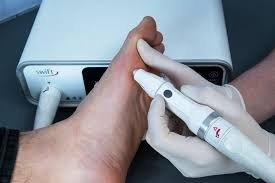How Smart Gadgets Are Revolutionizing Health Management for the Future

Smart gadgets are transforming how we approach health management, offering innovative ways to track, monitor, and improve our well-being. Today, with the integration of wearable devices like smartwatches, health apps, and fitness trackers, individuals can gain real-time insights into their physical condition, enabling proactive steps toward better health. These technologies allow us to monitor everything from daily steps and calories burned to sleep patterns and heart rates, bridging the gap between traditional healthcare and personal wellness. As our lives become increasingly connected, these gadgets are evolving into personal health assistants, providing data and insights that help individuals make informed decisions about their lifestyle and wellness.
Smart Gadgets as Personal Health Assistants
Smart gadgets have become indispensable personal health assistants, offering users a wealth of data and insights to help them manage their overall health. Whether through fitness trackers, smartwatches, or health apps, these gadgets are designed to keep users connected to their wellness at all times.
24/7 Health Monitoring
One of the most powerful features of modern smart gadgets is their ability to provide continuous, real-time health monitoring. Take the Huawei Watch D2, for example—this smartwatch can track your blood pressure around the clock. Whether you’re at work, sleeping, or simply relaxing, the device offers 24/7 monitoring. This constant flow of data provides you with a comprehensive view of your health, including average blood pressure readings and heart rate variability over the last 24 hours. For individuals who wonder, “does coffee bring up blood pressure?” smartwatches like the Watch D2 can offer personalized insights into how everyday activities affect your body’s vital signs, ensuring you stay informed about how factors such as caffeine consumption impact your health. Additionally, the ability to track these vital metrics at any moment can be invaluable for those managing chronic conditions. By pairing these devices with health apps like Huawei Health, users can easily track progress, receive feedback, and gain insights into their long-term health trends.
Personalized Feedback
Health gadgets also excel in delivering personalized feedback based on the data they collect. The Huawei Watch D2, when synced with the Huawei Health app, can provide detailed weekly reports, offering tips on how to maintain or improve your blood pressure levels. For example, if your blood pressure fluctuates during the day, the device will alert you and offer actionable recommendations, such as reducing caffeine intake or practicing relaxation techniques. This type of feedback ensures that users are not just collecting data but are actively engaging in managing their health. Moreover, the integration with apps allows users to personalize their health journey, setting specific goals such as reducing blood pressure or increasing physical activity.
Explore more : The Role of Packaging in Sustainable Baking
Preventing Health Issues Early
Proactively managing your health is crucial in preventing long-term issues, and smart gadgets are at the forefront of this approach. By continuously tracking vital signs, these devices can help identify potential health concerns early, empowering individuals to take preventive actions before they escalate into more serious conditions.
Proactive Health Tracking
Smart gadgets are not just for tracking fitness; they are also essential tools for proactive health management. Devices like the Huawei Watch D2 help users stay ahead of potential health issues by monitoring heart rate, blood pressure, and sleep patterns in real time. This constant monitoring helps users spot irregularities, whether it’s an unusually high heart rate after exercise or an unexpected dip in blood pressure. For example, if the app detects that your blood pressure consistently spikes after drinking coffee, it will notify you with personalized advice on how to manage this. Early detection of these patterns can lead to early intervention, whether through lifestyle changes or professional medical advice.
Predicting Risks with Data
Smart gadgets are not only useful for tracking current health data but also for predicting future risks based on past behavior. Using advanced algorithms, wearable devices can analyze trends and provide forecasts about your health, helping you take preventive measures. If, for example, your blood pressure shows a consistent upward trend over several weeks, the device may predict an increased risk of hypertension and recommend that you seek medical advice. This predictive capability, paired with the detailed data these devices collect, gives users a comprehensive understanding of their health, far beyond what traditional check-ups can offer. The ability to anticipate potential health risks before they manifest is one of the most groundbreaking aspects of health gadgets.
Transforming Wellness
Smart gadgets are not just limited to tracking physical health—they are also playing a significant role in enhancing mental wellness. With the added pressure of modern life, mental health support has become just as essential as physical fitness, and wearable devices are stepping up to provide that support.
Mental Health Support
Many smartwatches, including the Huawei Watch D2, offer features aimed at supporting mental well-being. From mindfulness exercises to guided breathing techniques, these gadgets can help users reduce stress, improve focus, and foster relaxation. With the growing understanding that mental and physical health are interconnected, devices like the Huawei Watch D2 provide integrated support for managing both aspects of well-being. For example, if the app detects that you are under stress based on irregular heart rate patterns, it might prompt you to take a break and engage in a mindfulness session. By offering these tools directly on your wrist, smart gadgets make it easier to manage stress and maintain a healthy mental state.
Fitness Tracking
Fitness is another area where smart gadgets excel. With features like step tracking, calorie counting, and workout reminders, wearables encourage users to stay active and achieve their fitness goals. The Huawei Watch D2, for instance, automatically tracks workouts, providing insights into how your body responds to exercise. This continuous tracking helps users identify patterns in their fitness routines and adjust their goals accordingly. Moreover, fitness tracking is a great way to stay motivated. Seeing progress over time through data-driven insights can encourage individuals to keep moving, whether they’re training for a marathon or just aiming to improve overall health.
Remote Healthcare Access
One of the most significant benefits of smart gadgets is their ability to bridge the gap between patients and healthcare providers, especially in remote or underserved areas. For individuals managing chronic conditions such as diabetes or hypertension, remote monitoring tools have proven invaluable. Devices like the Huawei Watch D2 allow patients to track their blood pressure, heart rate, and other critical metrics without needing to visit a clinic constantly. This is especially beneficial for patients in rural areas where access to healthcare may be limited. By tracking these metrics continuously, smart gadgets ensure that individuals receive timely intervention and are actively engaged in managing their condition.
Conclusion
As technology continues to evolve, smart gadgets are set to play an even more prominent role in health management. From continuous health monitoring to personalized wellness recommendations, these devices offer a comprehensive approach to well-being. By empowering users with the tools to track, analyze, and improve their health, smart gadgets are paving the way for a future where individuals are better equipped to take control of their health. The fusion of wearable technology, data insights, and personalized feedback is revolutionizing how we approach healthcare, making it more accessible, proactive, and personalized than ever before.






